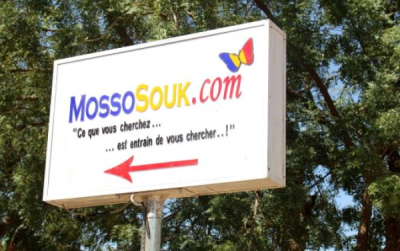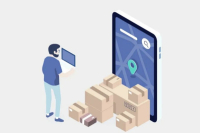
Solutions (583)
To create the right professional framework for workplace fulfillment, a Moroccan startup has developed a solution using artificial intelligence, augmented reality, and neuroscience.
Veezen is a digital solution developed by a Moroccan start-up. It enables companies to monitor the mental and psycho-emotional health of their employees, to positively impact their productivity.
Among other things, it aims to support entrepreneurs in the employee recruitment process and create the right working environment for optimal productivity.
“Healthy Employees are better able to focus on their work, leading to greater productivity and efficiency. [...] Healthy employees have greater energy levels, which can increase productivity as well as overall job satisfaction. [...] Healthy employees are less likely to get sick and need time off work, which can improve overall workplace productivity,” the solution indicates on its web platform.
Through its Android app, users can register by responding to prompts from the embedded virtual assistant. The virtual assistant guides users through the entire process, right up to the eventual appointment and the check-up by an expert. Appointments and check-ups are pretty uncommon as companies initially opt for group follow-ups.
Veezen contributes to the personal development of company staff through conferences and workshops on well-being. It also conducts employee surveys to identify any emotional or affective problems that may be negatively affecting personal and professional life.
Veezen was incubated at Stargate, a Moroccan incubator based on the campus of Mohammed VI Polytechnic University. In 2023, the start-up was one of the hundred Moroccan start-ups that took part in Gitex Africa, a technology trade show held in Marrakech from May 31 to June 2, 2023.
Adoni Conrad Quenum
When he moved to New York for his studies, Hanin Hadjeb, a young Algerian discovered a new restaurant business model, which he decided to reproduce back at home. Fast Delivery was then born.
Fast Delivery is a digital solution developed by an Algerian start-up. It enables users to order food, shop in supermarkets, and have the orders delivered to homes or offices.
From the Android or iOS apps, users can set up their accounts to access the various services. For orders to get delivered, users need to first input their address or let the mobile app detect it using the GPS feature. Then, they can add products to their baskets and validate the orders.
They can pay via bank card or in cash at delivery. The solution promises delivery within fifty minutes, depending on the weather and traffic conditions. In any case, the clients can monitor the process in real-time through the app.
According to Play Store statistics, the Android version of the application has been downloaded over a hundred thousand times. Fast Delivery only operates in Algiers and Blida and hopes to expand to other major cities in the country.
Adoni Conrad Quenum
The solution was launched in 2015, years before the coronavirus pandemic that gave a new impetus to the African e-commerce industry. It aimed to give a customized and revolutionary platform to residents in its native country, Chad.
Mossosouk is an online marketplace developed by a Chadian startup. It enables users to purchase various products. It also enables merchants to set up their virtual stores to reach more buyers.
"Many merchants didn't understand the [power of Internet]. We had to educate them to let them know that selling online was all to their benefit," says Andreas Koumato, founder and CEO of the startup behind Mossosouk.
The solution offers a mobile app, accessible on Android and iOS devices. Once they set up their accounts, users can access a wide range of products, including electronics, beauty, sports, and IT products, as well as special offers and promotions. Mossosouk also offers an option for tracking orders, from purchase to delivery. Delivery is handled by another department of the platform.
Merchants can also open virtual stores on the platform. To do that, they need to visit the platform, click the “Become a seller” button and follow the prompts. The e-commerce platform will require certain information and documents to validate sellers’ accounts.
For the time being, Mossosouk claims over 250 sellers. The Android version of its mobile application has already been downloaded more than 500 times. The company has not yet raised any funds but it plans to expand outside Chad and eventually become a reference in the African e-commerce industry.
Adoni Conrad Quenum
Owing to the number of middlemen in the agricultural value chain, food prices usually skyrocket from farms to markets. Despite that fact, farmers are usually unable to make decent living income from their products while consumers have to pay high prices for those same products. Jangolo wants to change that.
Jangolo is an e-commerce platform developed by a Cameroonian start-up. It gives consumers direct access to fresh produce via its web and mobile platforms. The Douala-based start-up behind the platform was founded in 2016 by Bertrand Foffe, Rodrigue Kwanga, and Paulin Nguekam. The aim is, among other things, to reduce local producers' post-harvest losses and boost consumers' purchasing power.
"We realized that by the time products go from farms to markets in Douala, their prices usually rise three folds on average. At least six middlemen intervene in the process, putting much pressure on the farmer who sells at a loss,” said Bertrand Foffe while expanding on the reasons that prompted the launch of Jangolo.
So, with two friends, Bertrand Foffe embarked on the Jangolo adventure. The start-up has developed an Android app, Jangolo Farm, which simplifies the buying process by allowing users to add products to their basket even when they are offline and validate the order when online. Users can also order via the web platform. Before anything, a user needs to be logged in or register an account. Once the orders are validated, the start-up's delivery service takes care of the delivery.
"Our services are focused on improving the living and working conditions of local farmers. We support farmers in their day-to-day operations. This means they can focus on their core business, and no longer worry about marketing” aspects, adds Bertrand Foffe.
Currently, the startup is only available in Douala. It says it is currently unable to serve other cities because some areas are hard to reach. In the areas covered, delivery costs CFAF500 (around $0.82). Buyers also have the choice to go to one of the startup’s sales outlets to simply pick their orders.
Jangolo boasts over 70,000 users, more than 5,000 products on its platform, and over 600 shops. Its application has already been downloaded more than a thousand times, according to Play Store data.
Adoni Conrad Quenum
The solution was co-founded by a trained nutritionist and dietician who decided to help those suffering from food-related illnesses and malnutrition.
Lya Dietitian is a digital solution developed by Ugandan start-up Impact Nutrition Limited. It offers clinical nutrition services and enables users to adopt the right eating habits to maintain good health.
Its founding startup, Impact Nutrition Limited, was launched in 2017 by Nankunda Ronnah and Regina Nantege.
Impact Nutrition Company Limited’s mission is to “reduce the growing health burden of diet-related non-communicable diseases, obesity, and the persisting levels of undernutrition in Africa. Each person with a diet-related disease or malnutrition deserves access to appropriate diet therapy for a healthy life,” the startup explains on its web platform.
To successfully carry out this mission, in 2022, the startup launched its Android and iOS apps. Once they set up their accounts, users are required to enter some information about their health and the goals they wish to achieve through Lya Dietitian (weight loss, blood pressure control, etc.). Based on this information, the start-up's nutrition and dietetics experts suggest adequate solutions.
Users then begin to receive daily customized meals, with Lya Dietitian tracking the subscribers’ progress over time. It should be noted that the solution also provides nutritional advice and healthy products that can help achieve various health goals.
According to Play Store data, the Android version of the app has been downloaded over a hundred times.
Adoni Conrad Quenum
Unlike most of the fintech solutions sprouting across Africa, the solution chose to add Sharia-compliant products and services.
HalalVest is a fintech solution developed by a Nigerian start-up. It facilitates access to financial services such as savings, loans, investments, insurance, pensions, and payments.
As a Halal-friendly solution, the fintech works with financial institutions to help them list their Sharia-compliant products. It facilitates electronic payments and the collection of Islamic alms like zakat, sadaqah, and waqf. It aims to democratize access to interest-free financial products and services.
“We are focused on building and sustaining long-term access to ethical financial products and services. [We aim] to be a leading Non-Interest Fintech Bank in Africa and Middle East region,” the solution indicates on its web platform.
Users can sign up for HalalVest's services through their Android app by completing a specialized form. After verification, they gain access to a variety of ethical savings and investment plans from multiple providers. HalalVest serves as a convenient platform for accessing traditional financial services and more. Through their web platform and mobile app, users can conveniently transfer funds to any bank globally.
The fintech claims a thousand members and serves around 5 countries in Africa and the Middle East. According to Play Store, its mobile application has already been downloaded over 100 times.
Adoni Conrad Quenum
The startup behind the solution was founded by two Moroccans with decades of experience in the pharmaceutical industry. When they decided to venture into entrepreneurship, they turned to a rapidly-growing sector they knew best: pharmaceuticals.
Blink Pharmacie is a digital solution developed by Moroccan start-up Blink Pharma. It provides pharmacies with access to a marketplace where they can directly source pharmaceutical products from wholesalers and laboratories. The start-up, based in Casablanca, was founded in 2019 by Bertul Adil and Sami Khalil Mohamed Ali.
One of the main objectives of this solution is to prevent stock-outs and delivery delays. "We want to accelerate the digitalization of healthcare services [...] The healthcare sector is undergoing a profound transformation due to digital technology, and we aim to support healthcare stakeholders in this transformation. Leveraging our in-depth knowledge of the scientific and regulatory environment, as well as our background in healthcare, we have a deep respect for the ethical rules that govern the sector," says Sami Khalil Mohamed Ali.
Blink Pharmacie launched its mobile app for Android and iOS in 2020. Users can create an account on the app to access the marketplace. During the account setup process, users are required to specify their professional designation, such as pharmacist, pharmacy technician, laboratory representative, wholesaler, or visitor. These designations are then authenticated by the start-up to provide a better framework for its activities.
Laboratory representatives and wholesalers can use the app to share news about new product launches or advertising campaigns and monitor prospects in real-time. Based on the data they collect, they can adjust their marketing strategies for greater efficiency.
According to Blink Pharma, the platform currently has over 4,500 registered pharmacists, more than 41 wholesalers, and over 20 laboratories. The Android app alone has been downloaded more than 5,000 times, as reported by Play Store data.
"We faced significant challenges in authenticating pharmacists, particularly due to the regulations governing the medication supply chain. Initially, it was difficult to convince people about our idea. However, through hard work, we have successfully carved out a niche for ourselves in the market," explains Sami Khalil Mohamed Ali.
Adoni Conrad Quenum
Branper combines two words, “brand” and “perception”. The solution offers tech entrepreneurs another way of assessing their brand image. Thanks to Branper, they can anticipate certain situations.
Branper is a B2B service developed by strategy consulting firm GOWL. It enables users to conduct or participate in customized surveys and market research. Tech entrepreneurs can use it to optimize their business intelligence and customer experience by predicting consumer trends. It aims to get insights, customer perceptions, and benchmarks.
The service has no mobile app so users need to visit its web platform to access its services and features. They can register either as users or tech entrepreneurs and access the Branper dashboard. During registration, the platform collects personal information, which can be used by its clients for brand advertising.
Users can then take part in various surveys or market studies. "The questions mainly focus on consumer satisfaction at each stage of the sales process. That is to say, how they are welcomed in the stores, how their request is handled, how interest was shown in their needs, the quality of the products, whether they intend to recommend the brand or not, and whether they plan to buy the brand's products or services again," says Saïd Ben Jlili founder of GOWL.
Each survey earns users points that can be redeemed for airtime top-ups or gift vouchers. "Facebook's services are [gradually] becoming fee-based, which could harm SMEs. Brands are therefore called upon to work harder on customer satisfaction by finding other communication channels and more innovative strategies. They can no longer rely on their images alone," says Saïd Ben Jlili.
Adoni Conrad Quenum
After several incubation programs, including Plug and Play and 212 Founders, the Moroccan fintech is now growing rapidly and wants to invest in other African countries.
Hsabati is a fintech solution developed by a Moroccan start-up. Among other things, it enables the owners of very small, small, and medium-sized enterprises (VSMMEs) to track prospecting performance, stocks, invoicing, and finances.
"I've managed several SMEs, I've done consulting and freelance work with SMEs, and they all had the same problem (we didn't have the right tools). Either they were easy to use but too simple and not at all extensible, or they were very complex tools and you had to have a developer on hand. So, after a few months, we had to go back to Excel," founder Saad Kemou told We Are Tech Africa while expanding on the reasons that prompted the creation of Hsabati.
The solution has a mobile application accessible on Android and iOS. Once registered, a user can access the various functionalities that facilitate day-to-day business management. Hsabati is a turn-key solution with functionalities like "CRM", which lets users manage and organize customers and their contacts with all the necessary information, as well as the history of interactions, and "Finance", which lets them keep track of cash flow.
What's more, users can use it without even installing any software and they also need no tech skills. Nevertheless, a premium subscription is required. Its basic package costs MAD149 ($14.62) monthly against MAD249 for the premium package.
Currently, Hsabati operates in Morocco but, it plans to conquer international markets, starting from West Africa. "The simplest and most historic connections are Côte d'Ivoire and Senegal, and then we can expand to the other countries of the West African Economic and Monetary Union," Saad Kemmou said.
Since its launch in 2019, the solution has attracted $600,000 in funding to support its growth.
Adoni Conrad Quenum
Africa suffers from inadequate access to education despite the governments’ efforts. To address the challenges preventing access in some regions, tech entrepreneurs create edtech tools but, they are sometimes inadequate to ground realities.
Genoskul is an edtech solution developed by a Chadian start-up. It allows access to online training courses, and tutors. It also allows users to get relevant answers to their questions, thanks to its smart assistant.
Through its Android app, users can register with an email or phone number to access services like virtual classrooms, where they can discuss with other learners.
"The virtual rooms interconnect learners from different backgrounds for an intellectual exchange. They are supervised by qualified teachers for effective preparation for national and international secondary and higher education exams and competitions,” the startup explains.
Genoskul offers courses in a diverse range of professions such as loincloth shoe making, shea butter processing, and rabbit breeding, as well as in public management and sustainable development, and civic action. According to Valery Kagro, founder of Genoskul, everyone should have access to the education and training of their choice, whatever their age or the type of training they aspire to.
To support its growth, Genoskul has raised CFAF5 million (around $8,149). It is also supported by Chad Innovation, an incubator that gave the start-up a stand at the Gitex Africa 2023 in Marrakech, Morocco.
Recently, it told We Are Tech Africa it has over 17,000 users in French-speaking African countries. It also indicated it was planning to create an English and Arabic version of its platform to expand to African countries where these languages are spoken.
Adoni Conrad Quenum
More...
The solution was developed by a Cameroonian doctor to offer a customized solution tailored to local realities for affordable access to home healthcare.
Clinic Home is an e-health solution developed by E-santé Cameroun. It enables users to book appointments for home or remote consultations with doctors, general practitioners, or specialists. It also offers home laboratory and online pharmacy services.
Based in Douala, E-santé Cameroun was founded in 2021 by Philippe Ohandja, a trained doctor. Its solution aims to smooth the care pathway. For that purpose, it developed a mobile app -available for Android and iOS users- through which users can register and start booking services. To book the services of a practitioner, they just have to fill a form informing of the type of practitioner they need, when and the type of service they need as well as their conditions.
"Few minutes after payment is made, a teleoperator will call [the user] and forward the call to a doctor who will make an over-the-phone assessment before going to the patient’s home. After the consultation, if necessary, the doctor will ask a nurse to go to the patient for further tests or nursing care,” Philippe Ohandja told We Are Tech Africa at Gitex Africa (May 31-June 2) in Morocco.
If needed, the patient can also buy drugs and directly request for tests right from the mobile app.
A consultation with a general practitioner affiliated with Clinic Home costs CFAF10,000 (around $16.41). The fee rises to CFAF15,000 for consultations at night time or at weekends. Consultations with specialists cost CFAF15,000 at daytime and CFAF20,000 for night and weekend consultations. Teleconsultation, on the other hand, costs CFAF3,000.
The start-up claims around 25,000 users. In 2022, it joined an acceleration program in the Sahel through I&P (investors and partners). Although it has not yet completed a financing round, E-santé Cameroun plans to expand outside Cameroon, starting with Côte d’Ivoire.
Adoni Conrad Quenum
Common law is practiced in some 80 countries around the world. Lawyers can therefore refer to court decisions in these countries to defend their clients more effectively. However, accessing such information can sometimes be tedious. Hence the importance of Judy Legal.
Judy Legal is a digital solution developed by a Nigerian start-up. It gives lawyers easier access to case law from common law countries (around 80 countries), particularly Nigeria, Kenya, and Ghana, to help them defend their cases in court.
It aims to be the “most comprehensive, most utilized database of case judgments in the world.”
“Our mission is to support the legal profession and the administration of justice by providing a law reporting service in a convenient form and at a moderate price,” it says.
With its Android and iOS apps, users can access its services once they set up accounts and buy a premium subscription. The type of services they are given depends on their subscription type. The startup has three premium subscriptions. The basic subscription costs $25 monthly and allows services like choosing a database, refining cases by date, court, country, and subject matter, and also highlighting comments. There are also the standard ($50 monthly) and premium ($150 monthly) plans besides the basic plan.
Since its launch, the Android version of its mobile app has been downloaded more than 10,000 times. In 2018, Judy Legal was one of the winners of the Meltwater Entrepreneurial School of Technology (MEST) program, going home with a $100,000 check. Two years later, it was selected to take part in the fifth cohort of Google for Startups Accelerator Africa.
Adoni Conrad Quenum
After working for five years in American firms such as Yahoo, Bassem Bouguerra decided to return to his country, Tunisia, where he launched a start-up shortly before the Covid-19 pandemic.
IntiGo is an e-mobility solution developed by a Tunisian start-up. It allows users to book taxi scooters and vehicles for hire for their errands and package deliveries. The Tunis-based startup was founded in 2019 by Bassem Bouguerra and Nebil Jridet. Since its launch, it has raised $1.6 million to develop its technology, expand its offerings and accelerate its growth in Tunisia, among other things.
"We provide our customers with comfortable and [most modern] cars. We also offer coupons and do not increase prices during peak hours," explained Bassem Bouguerra.
Via its mobile application -available for Android and iOS devices, users can signup to access its services. For a lift, users enter their destination and get quotes for every transportation means available. Then, they can choose the means they want and even filter based on drivers’ ratings or the nearest ride.
In addition to urban transportation, the startup deals with package, grocery, and food delivery. It has seven warehouses where items can be stored. During the coronavirus pandemic, the startup recorded a boom in the number of weekly deliveries. But, after that period, it went from an average of 2,000 to 600 deliveries weekly.
By 2023, IntiGo was claiming more than 200,000 runs and 60,000 app downloads. According to Play Store statistics, its Android app has been downloaded more than 50,000 times, which corroborates the figures put forward by the start-up. IntiGo has expansion plans but, it wants to wait for the right timing, the right destination, and the right product that can compete in international markets.
Adoni Conrad Quenum
After going through an incubation program in 2022, the Kenyan agritech launched its pilot phase in February 2023. Then, with its partners, it decided to proceed to the official launch this month.
Tawi is an agritech marketplace developed by a Kenyan startup. It allows hotels, restaurants, caterers, schools, and hospitals, to directly access fresh produce from small-scale farmers via its web platform. The startup, founded by Cherotich Rutto, launched its platform in 2023 after incubating with SC Ventures, a subsidiary of British bank Standard Chartered.
“Tawi will connect our farmers to an estimated Sh200 billion (US$1.6 billion) market opportunity. Through this platform, farmers will earn more for their produce while also improving the supply-chain efficiency of high-quality products to commercial clients," said Cherotich Rutto, the founder and CEO of Tawi.
The solution does not have a mobile app yet. So, users need to visit its web platform to register either as buyers or sellers.
Between February 2023 when it started testing the platform and May 2023 when it officially launched, Tawi has registered more than 1,000 farmers, and 250 commercial kitchens and made more than 1,000 deliveries.
Deliveries are managed by the startup’s logistics teams, 12 to 18 hours after the orders (a minimum of Ksh2,000 or $14.71) are completed.
The agritech ensures that at least 25 percent of the farmers it partners with are women and youth and that 90 percent of the produce comes directly from farmers. It also plans to integrate financial services like loans and microinsurance, as well as agronomic assistance to spearhead the adoption of good agricultural practices. For the time being, the startup, launched on May 9, 2023, has no expansion plan.
Adoni Conrad Quenum















